5 March 2015
Book report
Posted by Callan Bentley
It’s been a long while since I last reported here on what I was reading. I’ve now got a huge backlog of books to blog (almost a year’s worth) and the task becomes ever more intimidating with each new cover that I close.
So here are some short reviews:
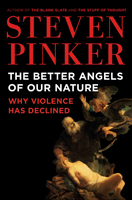 The Better Angels of Our Nature: Why Violence Has Declined, by Stephen Pinker
The Better Angels of Our Nature: Why Violence Has Declined, by Stephen Pinker
An astonishingly comprehensive multipronged investigation into the decline of violence over history and even over your lifetime. Feel like you’re living in a dangerous world? the latest videos from ISIS, repeated endlessly on YouTube and Fox News, may have you feeling very threatened indeed, but it turns out that if you quantify your assessment of risk of violence, you’ve never been better off than right now. Let Pinker set you straight. I listened to the 30+ hour audiobook version of this tour de force, and I’m so glad I did. The world of the past was a brutal, unjust place where people could own people, husbands were expected to beat their wives, and children could be hanged for stealing a petticoat. Priests torturing those who didn’t tow their faithy line, schoolteachers beating children with paddleboards, religious Crusades, illegal homosexuality: Ugh. The past is a foreign country, and it’s not one you’d want to visit. Pinker’s first step is to demonstrate this change, and then he sets out to explain it. There are too many variables for me to get into in a one-paragraph review, but let me say this: it is a compelling, eye-opening read. I highly recommend it.
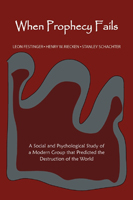 When Prophecy Fails, by Leon Festinger, Henry Riecken, and Stanley Schachter
When Prophecy Fails, by Leon Festinger, Henry Riecken, and Stanley Schachter
A sociological/anthropological study of a UFO/religious cult who predicted the end of the world, and what they did when the world kept on existing in spite of their prophecy being disproved. A thoughtful “live experiment” study from the 1950s with embedded secret observers (not sure this would count as “ethical” today) getting an inside look at how true believers rationalize reality’s inconsiderate invalidation of their cherished beliefs. If they were interested in being confident that they weren’t mistaken, this lesson from the 1950s and with the faintly ludicrous space aliens as godlike agents would be useful reading for modern day anti-factual groups, such as Harold Camping’s Rapture posse, young-Earth creationists, climate change denialists, Mayan calendar apocalypsists, and the recent spate of under-informed and willfully evidence resistant anti-GMO, anti-fluoridation, and anti-vaccination activists.
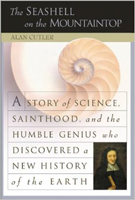 The Seashell on the Mountaintop, by Alan Cutler
The Seashell on the Mountaintop, by Alan Cutler
A historical biography of Nicholas Steno, putting the standard textbook treatment of his geological contributions into the context of the social and scientific (and religious) milieu of 17th-century Europe. Through reading this thoughtful assessment (written by a professor at nearby Montgomery College), I learned about Steno’s training in the medical field, and his celebrated demonstrations of anatomy – back then, it was considered great entertainment to watch Steno dissect a corpse. This anatomical aptitude led to Steno being the obvious choice for the dissection of the head of a captured large great white shark. As he worked, he considered the similarity between the beast’s profuse blade-shaped teeth and the glossopetrae (“tongue stones”) harvested from the island of Malta, and sold as a medicinal agent. The glossopetrae were really shark tooth fossils, and Steno was the one to figure that out. He realized that fossils were fossils, in the modern sense of being the remains of (or traces of) ancient life. The glossopetrae were of course without medicinal benefit, but Steno didn’t figure that part out. What he lacked in medical insight he made up for with pioneering studies of the Tuscan rocks near Florence, Italy, where he spent the most academically productive years of his life. I also had my eyes opened to Steno’s intense religiousity, which took his Danish Lutheranism into a new culture and saw it react: his faith denatured in Italy with a conversion to Catholicism. This led him to abandon not only geology but all science in the latter part of his life (~13 years), embracing an ascetic life as a clergyman until he finally denied himself enough self-care that he died. He was eventually beatified by the Vatican.
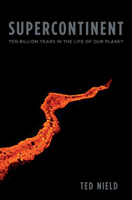 Supercontinent, by Ted Nield
Supercontinent, by Ted Nield
The author is editor of Geoscientist magazine and the Science and Communications Officer for the Geological Society of London. He has written a book about supercontinents past, present, and future, as well as mythological. The imagined supercontinents of yore (such as Lemuria) struck me as indulgent, but then Nield discussed the cultural and political appropriation of mythological supercontinents in human thought, and I found that interesting (as someone interested in the relationship between intellectual/academic insights and wider cultural trends in society). Further, he makes the case that having the intellectual precedent established (even if these false supercontinents were finally disproven) was critical to the eventual reconstruction of real supercontinents from Earth’s history. But Pangaea, unlike Lemuria, has evidence to support its existence, and that evidence is robust enough and remote enough to have no immediate bearing on the sociopolitical trends of the modern day. I love this quote, from page 26:
Imagined worlds, both past and future, embody assumptions that affect our vision of ourselves, our past and future, our identity, our prospects. As human beings, our own species and what might happen to it lies at the heart of most of our thinking. The unsettling thing about the universe is the fact that our existence has no importance; and the unsettling thing about science is that it reflects that. The effect has come to be called the ‘progressive dethronement’ of Man. Science attempts to find out how things really are, rather than (for example) to frame myths to explain things away while at the same time flattering our vanity by putting humans at the centre of everything. When geology rebuilds the lost worlds of nature, the assumptions it employs put no weight on human beings’ mental comfort.
That speaks to me. The book has numerous such thoughtful gems in it, as well as terrific turns of phrase, such as describing stromatolite formation as being like a lasagna made of “slime and lime” (page 235), or the development of coelomate animals’ ability to burrow (page 255): “the fine, undisturbed laminations of Lasagne World became rare as the garden of Ediacara went under the plough.” Much of the latter part of the book is spent in teasing apart the geological signatures of two models of the supercontinent cycle (extroversion and introversion), and I didn’t find those supercompelling. One small factual quibble: Since Nield is an editor immersed in geology, I was surprised by a blatant error in the book – the statement on page 231 that oxygen makes up “16%” of the modern terrestrial atmosphere (the accepted value by volume is just shy of 21%). Odd.
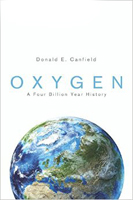 Oxygen, by Donald Canfield
Oxygen, by Donald Canfield
This book, by a leader in the geochemical study of Earth’s past atmospheric composition, was weak. I wanted it to be good. I wanted it to be a new Life on a Young Planet (Andy Knoll’s 2003 masterpiece of science explanation), but that hope was unfulfilled. Canfield has made great contributions as a scientist, but this book is a demonstration that science journalism should probably be left to those who have a natural ability to do it well. A particularly egregious example of the lack of ability is the clumsy diagrams and illustrations. Some look as if they were composed in PowerPoint by someone who failed art class. I honestly don’t understand how something so blatantly low in quality can make it into a book by a celebrated scientist. Did the peer reviewers focus only on the science and have nothing to say about the presentation, the lack of elegance? Where was the editor? I would duplicate one of the images here, but it makes me cringe just to look at them, so I won’t. There are also little things, like “Gowganda” being misspelled, that someone should have caught, if those who were responsible for producing this book were being meticulous about their jobs. Honestly, this book should have been awesome, and instead it’s super weak. Skip it, and read Andy Knoll’s book instead.
 Yes, Please, by Amy Poehler
Yes, Please, by Amy Poehler
Poehler is a comedienne of great ability, and I was eager to see how she wrote. It’s insightful in its analysis of feminism in the modern entertainment industry, the trials of parenthood, and (in one odd section) the pathos of Haitians in the aftermath of their great earthquake. This serious stuff is spiked, liberally, with gut-busting humor. I haven’t laughed out loud at a book this much since Bill Bryson’s A Walk in the Woods. Poehler is hilarious and smart. Your time with her is well spent. It’s inevitable that this book should be compared with Tina Fey’s Bossypants, so I’ll say this: Bossypants felt more complete, of a common cloth. Yes, Please felt more rushed, haphazard, cobbled together. In many places, she writes about how hard it is to write a book. Parts of it match up well, but other parts seem stapled on without editorial regard for form or flow. But who cares? Poehler’s got some truths to slap into you, and you’re going to enjoy hearing them.
 City of Fortune, by Roger Crowley
City of Fortune, by Roger Crowley
This book is a history of Venice, Italy, by the same author of 1453 (one of the best books I’ve ever read) and Empires of the Sea, which didn’t grip my imagination quite as tightly. The first part of the book, which recounts the context and actions of the Third and Fourth Crusades, is excellent, and has a tidy cast of characters that made it comprehensible to me. Good Lord, it was insane what people felt was morally justifiable in that faith-soaked era. Astonishing depravity and betrayal, the sort of decisions suitable for Frank Underwood. But the majority of the book recounts in detail various sieges and ploys that play out century after century as Venice’s fortunes rise and fall. There are so many historical figures entering and exiting the story that I couldn’t keep track of who was who, or why they were doing what they were doing. I sometimes feel this way about Game of Thrones, but that show at least makes most of its motivations apparent, and the machinations are mixed up with beautiful scenery and the spices of sexyness and mystery. City of Fortune lacks these compelling flavors, and after the narrative lost me, I got bored. I didn’t finish it; I only got about halfway through before giving up.
 Waking Up, by Sam Harris
Waking Up, by Sam Harris
I have really been enjoying Harris’s books – the excellent The End of Faith (and its followup, Letter to a Christian Nation), and the thoughtful, ground-breaking The Moral Landscape. This one is about having a “spiritual” life without religion. The word “spiritual” is problematic on several levels, but Harris addresses this early on, and shrugs his shoulders with the lack of better terminological options. He accepts the word to stand for insights about consciousness, and the experience of reaching them. He draws on meditation, neurological analysis of psychological experiments, and psychotropic drugs like Ecstasy as evidence in part of the journey towards a better sense of the nature of our own minds. Harris has apparently spend much of his conscious adult life exploring consciousness, and has participated in experiences that have been illuminating and disillusioning in equal measure. As with The Moral Landscape, this is not a book that’s intended to be the final answer to key, fundamental questions, but an intellectual prompt for people to consider what it means to know one’s own mind in the absence of ascribing consciousness’s effects to some supernatural entity. One of my favorite parts of Waking Up is the discussion of the concept of a soul, and the fascinating series of experiments on people whose corpus callosum was severed, eliminating communication between the left and right hemispheres of their brain. I’ll leave the details for Harris to narrate directly to you and your mind – but the take home message is this: Any testable definition of a soul would class these people as having two souls with independent desires, sometimes in conflict with one another. Fascinating stuff – how many souls does your brain hold? One? Two? Three? None? Check it out.
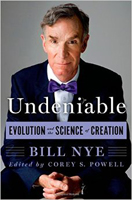 Undeniable, by Bill Nye
Undeniable, by Bill Nye
A book about science, in contrast to other “ways of knowing,” as inspired by Nye’s debate with a Young Earth creationist in Kentucky. It’s classic, typical Nye. Sort of cheerfully snarky without ever being mean. Very earnest, and maybe a little corny, too. It’s subdivided into more than 35 chapters, each a little vignette or set of vignettes exploring some scientific insight, presented positively and enthusiastically. These are frequently compared with a failure of Young Earth creationist logic on the same topic, but Nye isn’t combative by nature. Even in his celebrated debate with his Ham-fisted opponent, he opted to focus on the wonder and glory of scientific insights about the nature of reality, rather than participating in a point-counterpoint rhetorical approach. Overall, I got a few new insights from this book (did you know the London Underground has evolved its own species of mosquito, for instance?) but Undeniable isn’t a masterwork in the same class as say, Richard Dawkins’s The Greatest Show on Earth, which covers the same ground in a more breathtaking, incisive way.
 An Appetite For Wonder, by Richard Dawkins
An Appetite For Wonder, by Richard Dawkins
Speaking of whom…. This is the first volume of a projected two volume autobiography by Dawkins. Of everything I’ve read by him, this was the weakest book. He’s a forceful and erudite writer when delineating insights into the way evolution functions on Earth, or the lack of reason exhibited by so many people in assessing reality, but that oomph doesn’t come to bear so much on anecdotes from his young childhood in Africa, or his days in boarding school. The subject matter just isn’t as compelling. There are some authors who write so well, and choose their material so thoughtfully, that I would willingly read whatever they write. Steven Pinker is one, Sam Harris another. John McPhee is the ne plus ultra (a phrase I learned from him) of this sort of author for me. But it appears Dawkins isn’t. I loved his The Greatest Show on Earth and before that I loved The Ancestor’s Tale more than almost any other science book I had ever read. But An Appetite For Wonder isn’t Dawkins’s Greatest Show, and it’s really not even close. I wouldn’t put it at the top of my list of recommendations.
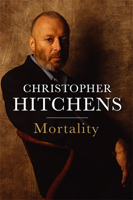 Mortality, by Christopher Hitchens
Mortality, by Christopher Hitchens
A selection of more-or-less connected essays written by Hitchens during his final months of life, when he knew his cancer was going to kill him soon. Some good stuff in there, and a nice affirmation of his secular values when staring into the abyss, but the book was also repetitive with many of its key points/quips/realizations. It could have used some more pervasive, thoughtful editing. It felt rushed (as it certainly would have been, considering the looming ‘deadline’). Still, couldn’t it have been cleaned up a bit before being sent to the printing press? In sum: Mortality is not his strongest work, but it is his last – so I guess it deserves to be read on that count. One thumb up, one thumb down.
There, I’m all caught up. Hopefully from this point on, I can review books here on a one-book-per-post basis again.
Gosh, looking back over this list, I’m astonished at how uniformly white, and overwhelmingly male, my reading has been. Maybe I need to take up this challenge like Anne Jefferson of Highly Allochthonous is doing. But first, in the hopper I’ve got four other books I’m excited about – all, unfortunately, by white men. The Patriarchy is alive and well on my bookshelf, apparently.


 Callan Bentley is Associate Professor of Geology at Piedmont Virginia Community College in Charlottesville, Virginia. He is a Fellow of the Geological Society of America. For his work on this blog, the National Association of Geoscience Teachers recognized him with the James Shea Award. He has also won the Outstanding Faculty Award from the State Council on Higher Education in Virginia, and the Biggs Award for Excellence in Geoscience Teaching from the Geoscience Education Division of the Geological Society of America. In previous years, Callan served as a contributing editor at EARTH magazine, President of the Geological Society of Washington and President the Geo2YC division of NAGT.
Callan Bentley is Associate Professor of Geology at Piedmont Virginia Community College in Charlottesville, Virginia. He is a Fellow of the Geological Society of America. For his work on this blog, the National Association of Geoscience Teachers recognized him with the James Shea Award. He has also won the Outstanding Faculty Award from the State Council on Higher Education in Virginia, and the Biggs Award for Excellence in Geoscience Teaching from the Geoscience Education Division of the Geological Society of America. In previous years, Callan served as a contributing editor at EARTH magazine, President of the Geological Society of Washington and President the Geo2YC division of NAGT.
Thanks for the reports. I added a couple of them to my audible wishlist. I listened to Seashell on the Mountaintop a while ago. It then became very depressing when creationists made the news. I’d think “theologians figured this out centuries ago.” Sigh.
RE Undeniable, by Bill Nye. You’ll be happy to hear that Nye has recently (last 10 days or so) been converted from a GMO skeptic to a GMO supporter.
Also, you might like to read the scholarly criticism of “The Better Angels of Our Nature: Why Violence Has Declined,” by Stephen Pinker See http://en.wikipedia.org/wiki/The_Better_Angels_of_Our_Nature#Negative